#happy end of noirvember :')
Note
If it’s possible I was wondering if you could gif Desert Fury? Such a great and underrated film noir.
ooh i've been meaning to watch desert fury for a while now! but whether or not i will be able to gif it will depend on whether or not my download finishes 🙈 i'll try my best tho, anon! 💗
#i do gif 1080p but like those big 1080p files for old movies can take a while to download#especially when the movie isn't like super popular 🤧#i mean i have giffed with the smaller 1080p files and been more than happy with the outcome but bigger is usually better#i say usually because i do think you can good results with something that isn't the biggest file ya know#okay these tags truly went off on a tangent lmao#the point i was trying to get to is that if the bigger file doesn't finish downloading before noirvember ends#i'm willing to settle giffing with the smaller file but we're gonna see maybe the big file will finish#also when i mean ''smaller 1080p files'' i mean like 2gb and less#asked and answered
2 notes
·
View notes
Note
you should tell me about golden age hollywood please !!!
Crying and shaking anon you are the love of my life so you are going to be subject to hearing about The Postman Always Rings Twice (1946).
Confession I have seen this movie a measly one time so I don't remember the plot that well but this movie is not known for its plot if that makes sense? It's a film noir (one of THE film noirs) and it stars Lana Turner and John Garfield. Lana Turner's character is married, she doesn't want to be, John Garfield's character is the Walter Neff type where he's normal until he meets a femme fatale but he always kind of sucked, I don't blame him for wanting to run off with Lana Turner one bit because I would too.
So some interesting things about the BTS of the movie is that apparently Lana Turner was PISSED John Garfield was cast, and allegedly said, "can't they hire someone more attractive?" And there's this one director friend of Garfield's who says that the first day on set, they immediately clashed but ended up having a short affair before breaking it off before it really began. Which is really funny if it's true because she was all up in arms about him being cast. I don't remember if she was married at the time but he was (his wife who was a Communist which did cause problems for him just a few years down the road which I would be happy to also talk about) and according to this same director person this was the only time he ever got involved with a costar. (I think it's important to look at the source of what is said, even if it's probable and a safe bet, because sometimes what you think is a "cool and unique fact" is actually a lie made up by Charles Higham. Not that I would know anything about that.)
The reason this movie works as well as it does is because of the leads though because they are both believable in their roles and both give great performances. But that's not why it's so well known...watch Turner's character's entrance because they have such good chemistry it's off the charts balls to the walls insane. Everything about this scene is so well done and the music adds so much to it and!!!!!!!!!!!!
Another thing that I think is really cool is how Turner is costumed. Her character wears almost exclusively white which is a really cool subversion of the "white=innocence" thing because she is in fact one of THE femme fatale's of the classic noir era and she is in fact not innocent at all.
But yeah the plot is really not hard to guess if you've seen Double Indemnity (1944), which I think was based on a novel written by the same author as the one Postman was based on but I'd have to look that up. (Update it was) Both are great movies and they have hot dangerous women so what more could you want really.
So yeah if you want to watch a ~film noir~ this is a great option!!!!
1 note
·
View note
Text
Noirvember: 10 Film Noirs to discover
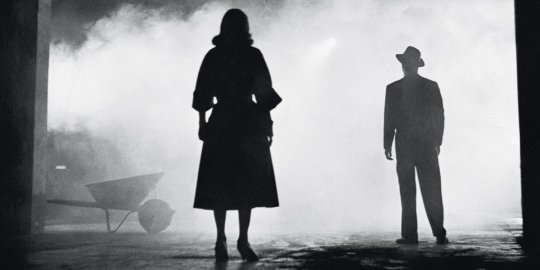
Noirvember. The concept is simple: the entire month of November is dominated by dark shadows, tough men, seductive femme fatales and dented fedoras from film noir. With film noir, every film lover immediately thinks of classics such as The Maltese Falcon, Double Indemnity or Touch of Evil.
The movement (or genre) had its peak from 1941 to 1958 and characterised itself as a series of crime films, permeated with nihilism and dark melancholy. In order to not bore you with obvious choices, I’ve picked ten film noirs that are often overshadowed by the great classics, but believe are equally worthy of attention.
Gaslight (1944)
“Whatever you had done, I could have pitied and protected you. But because I am mad, I hate you. Because I am mad, I have betrayed you. And because I'm mad, I'm rejoicing in my heart, without a shred of pity, without a shred of regret, watching you go with glory in my heart!”
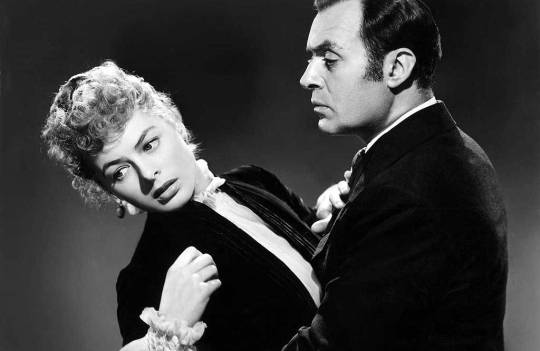
In the early 1940s, many directors were happy to venture into film noir, including George Cukor. With essential Hollywood films such as Dinner at Eight and The Philadelphia Story, Cukor was used to very different things. The power play between men and women is no stranger to film noir and also returns in Cukors Gaslight. Ingrid Bergman and her new husband move into the old house of her murdered aunt. Soon all kinds of strange events start to happen, which makes Bergman’s character doubt her mental health, without noticing that her husband is manipulating her. Bergman spent time in psychiatry in preparation for her role and eventually won an Oscar for it. Gaslight is also the film that coined the term Gaslighting:
Gaslighting is a form of psychological manipulation in which a person seeks to sow seeds of doubt in a targeted individual or in members of a targeted group, making them question their own memory, perception, and sanity. Using persistent denial, misdirection, contradiction, and lying, gaslighting involves attempts to destabilise the victim and delegitimise the victim's beliefs.
Instances may range from the denial by an abuser that previous abusive incidents ever occurred to the staging of bizarre events by the abuser with the intention of disorienting the victim.
Murder, My Sweet (1944)
"You shouldn't kiss a girl when you're wearing that gun ... leaves a bruise.”
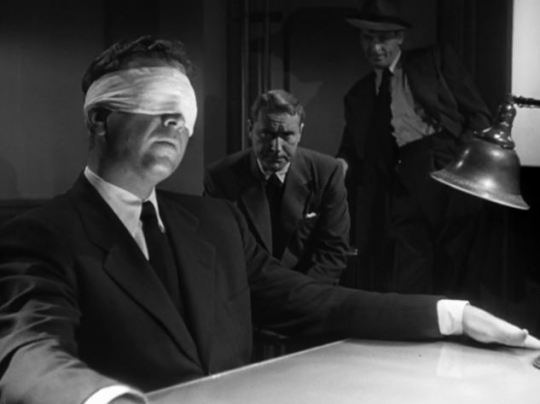
Edward Dmytryk, a director who is now as good as forgotten, nevertheless delivered some films that are worthwhile. For example, Dmytryk first brought Philip Marlowe to the big screen, the well-known private investigator conceived by Raymond Chandler. Not yet plated by Bogart (that only came with The Big Sleep), but Dick Powell. With ingredients such as lies, theft, perjury, deception and the false appearance of Claire Trevor, Murder, My Sweet contained everything that a solid film noir required.
Detour (1945)
“That’s life. Whichever way you turn, Fate sticks out a foot to trip you.”
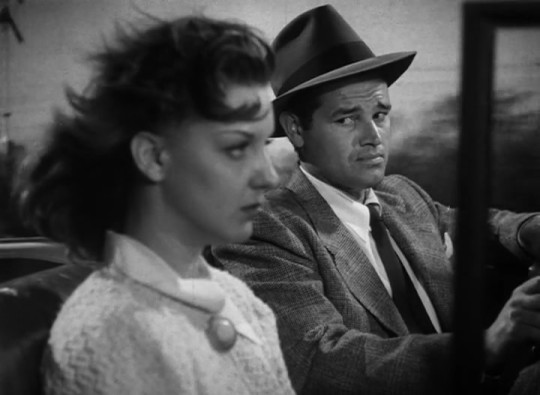
Detour is a film that was cast aside for a long time as a simple B film, but has enjoyed more recognition in recent decades as a highlight in film noir. According to director Edward G. Ulmer, the film was shot in six days, on only three sets, on a very low budget. Minimal in design or not, Detour proves to be an extremely powerful noir that, with its 68 minutes, perfectly captures the soul of the film genre Not many men enjoy so little luck in film noir as pianist Al Roberts (Tom Neal), not to mention a demonically calculating Ann Savage. More than worth discovering.
Scarlet Street (1945)
“How can a man be so dumb... I've been waiting to laugh in your face ever since I met you. You're old and ugly and I'm sick of you. Sick, sick, sick!”
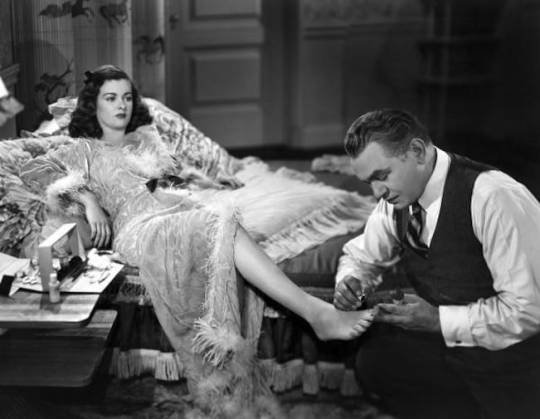
Fritz Lang: a big name from film history. Lang was not only successful in his German period, but also delivered quite a few hits when he went to look for happiness in America. Scarlet Street is perhaps one of the most pessimistic film noirs in film history. Edward G. Robinson shines as the gullible dope that runs into the treacherous web of Joan Bennet and her equally despicable friend. For a long time, Robinson's character throws himself into a downward spiral from which there seems to be no return. Great watch!
Nightmare Alley (1947)
"How can a guy sink so low?”
"He reached too high ...”

Just like Cukor, Edmund Goulding wasn’t necessarily a noir director. Nightmare Alley was his only trip into the genre, but a memorable one. After a lot of tug and war with the then conservative production code, Goulding nevertheless managed to deliver an ambitious film about the rise and fall of an opportunistic fair assistant. Alcoholism, religion, spirituality and manipulation are all dealt with in a film that takes away the joyful experience of a fair from all its frills. Nightmare Alley is a noir that tries to aim higher than the usual conventions and also succeeds at that.
Force of Evil (1948)
"A man could spend the rest of his life trying to remember what he shouldn't have said.”
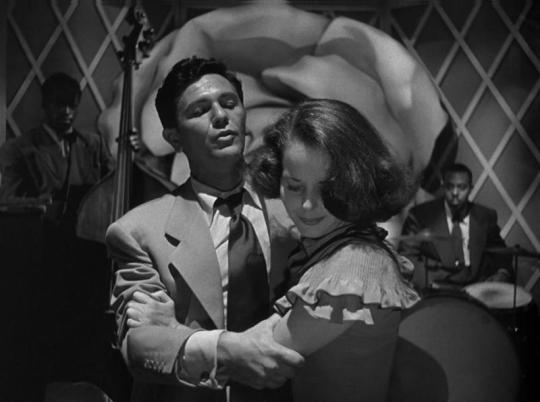
John Garfield, died at the age of 39, but was a force of nature when he was at his best acting wise. In Force of Evil we see him as a lawyer who deals with illegal draws to help his brother out of trouble. What you get are gloomy settings in New York, poetic dialogues and Biblical allusions. Crime is not a romanticised world in this thriller, but one where it’s a sad stay and you must inevitably face your fate. Among the fans of Force of Evil is a certain Martin Scorsese.
In a Lonely Place (1950)
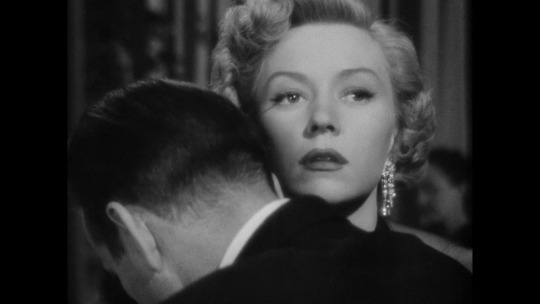
“I was born when she kissed me. I died when she left me. I lived a few weeks while she loved me. "
And here it is, our first Bogart film on this list. No Bogey as a tough detective, but as a cynical Hollywood screenwriter with loose hands. In A Lonely Place is often overshadowed by the more famous work of Bogart, but his performance in this film is one of the most impressive things he has ever done. His character runs tight with an intrinsic anger, but at the same time radiates a pitiful weakness. Directed by Nicholas Ray (who would later make Rebel Without A Cause), who subtly criticises the moral climate in the American film world and the celebrity cult.
The Big Heat (1953)
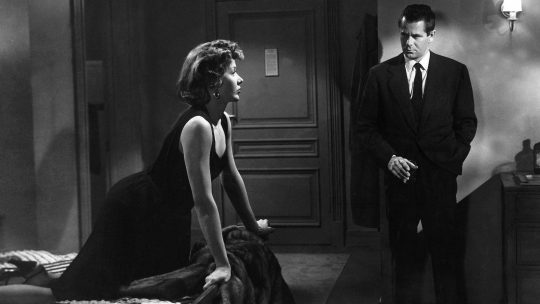
"Well, you're as romantic as a pair of handcuffs."
Second film from Fritz Lang on our list. Let us say that the brilliant German director knew film noir well. In this film, Glenn Ford plays a cop fighting against the crime syndicate in his city after his wife is murdered. The fact that the scenario was penned by a former crime journalist made Lang deliver one of the most fierce film noirs of the 1950s. The Big Heat also completely turns the traditional role of the femme fatale on its head. A hauntingly memorable moment is when a roaring Lee Marvin throws hot coffee in the face of Gloria Grahame.
Pickup On South Street (1953)
“So you're a Red, who cares? Your money’s as good as anybody else's.”
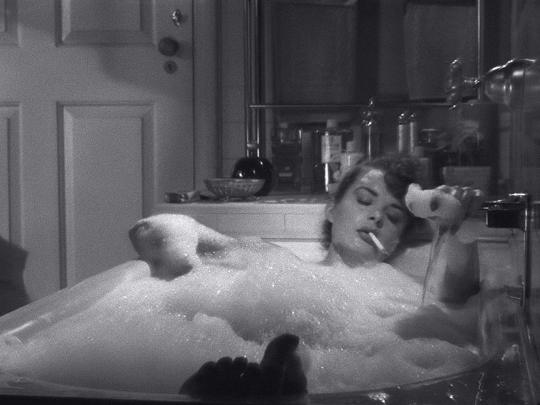
Richard Widmark steals Jean Peters' purse without knowing that it contains a microfilm with secret government information. Pickup On South Street dates from the McCarthy period, but that doesn’t stop director Samuel Fuller from throwing every ounce of patriotism overboard. Even FBI boss J. Edgar Hoover turned out not to be a fan. Anyway, still a film with great performances, juicy dialogues and a stubborn outsider as the main character. The film earned actress Thelma Ritter an Oscar nomination.
Kiss Me Deadly (1955)
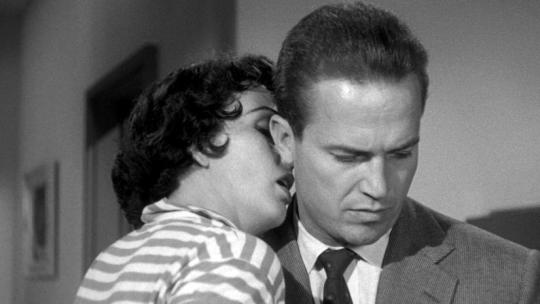
“Kiss me, Mike. I want you to kiss me. Kiss me. The liar’s kiss that says I love you and means something else. "
Kiss Me Deadly might have been a source of inspiration for Steven Spielberg's Raiders of the Lost Ark. You get that impression when at the end the mysterious artefact (aka MacGuffin) around which this film noir is built up, is found (sort of). According to some a metaphor for the nuclear paranoia, according to scriptwriter A. I. Bezzerides no more than the result of a search for what worked and what didn't. Metaphor or not, Kiss Me Deadly offers enough adventure, twists and intrigues for an exciting and entertaining movie night.
#back with a new post :)#film noir#film noirs#noirvember#noirvember list#film list#film suggestions#gaslight#gaslight 1944#murder my sweet#murder my sweet 1944#detour#detour 1945#scarlet street#scarlet street 1945#nightmare alley#nightmare alley 1947#force of evil#force of evil 1948#in a lonely place#in a lonely place 1945#the big heat#the big heat 1953#pickup on south street#pickup on south street 1953#kiss me deadly#kiss me deadly 1955#filmista
59 notes
·
View notes
Photo
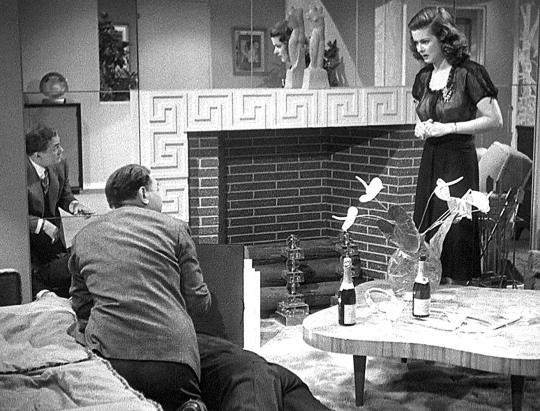
The Woman in the Window (1944)
Fritz Lang directed Edward G. Robinson, Joan Bennett, Dan Duryea, and Raymond Massey in this respectable noir.
Robinson plays a professor who chats with his friends at a club about a painting of a woman on display in a window. The friends find her astonishingly beautiful and discuss the possibility of the real woman who sat for the portrait.
Standing outside the club late one night Robinson meets the real woman and ends up going back to her apartment.
Soon after a man comes in and slaps her around and starts strangling Robinson who kills the stranger with scissors.
And Robinson and Bennett agree to hide the murder.
The suspense of whether she will betray him or if he will give himself away is good. The energy between Bennett and Robinson is not so good and the ending is not good at all. These are my opinions of course as The Woman in the Window is #1 on Paste’s list of Top 100 Noir Films. No way baby.
Scarlet Street, which I’ll talk about tomorrow and which wasn’t even on ‘the list’, is a better film with 4 of the same people.
I chose the photo above because I wondered if Truffaut studied Fritz Lang. You notice a lot of mirror shots in his films and we’ve got a pretty intense mirror shot here. Plus there are others as Bennett and Robinson pass windows, etc.
Anyway - I don’t mind if you disagree and in fact I love that. But this one just wasn’t one of my favourites.
More to come. Happy Noirvember!
2 notes
·
View notes
Text
As Noirvember Ends...
Before I begin, I’m going to clarify that, unlike the first list, the following films are personal favorites of mine that can be categorized as Noir. So, they may not be the best illustrations of the style/genre nor necessarily the best films that happen to be Noir. Honestly, the first list is better for that, though it has less detail.

In a way, you can view this list as “further viewing.” I will also be pairing this list with where you can find the movies at Movie Madness.

Here are my personal go-to Films Noir as Noirvember careens away down an abandoned highway on some rainy midnight. All films are profiled in detail BELOW THE JUMP. Happy viewing!

Ministry of Fear (1944)
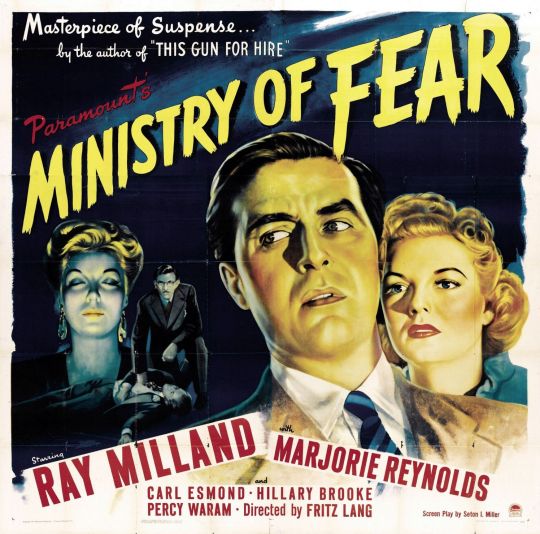
87 min. | Director: Fritz Lang
Screenwriter: Seton I. Miller (Novel by Graham Greene)
Stars: Ray Milland, Marjorie Reynolds
What’s the story?
Stephen Neale (Ray Milland) is making his way to London after his release from a countryside asylum. Neale happens upon a village fair run by the Mothers of Free Nations and wins a cake in a guess-the-weight contest he wasn’t meant to win. After boarding a train to London, Neale is accosted over the cake but manages to escape unscathed. With the backdrop of London in the midst of the Blitz, Neale and a private investigator try to get to know what the Mothers of Free Nations is all about. Carla (Marjorie Reynolds) and Wili (Carl Esmond) are refugee siblings who run the charity and they begin to lead Neale down a serpentine path of espionage.
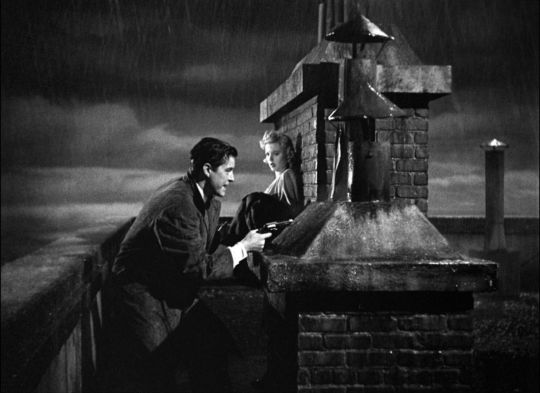
Why should I watch it?
Like The Third Man (1949), Ministry of Fear is an adaptation of a Graham Greene novel. Greene did not collaborate on the screenplay for this film though, and it shows. But, other aspects of the filmmaking more than make up for it. Much credit is due to some shared talent with Double Indemnity, which came out the same year: Art Directors Hans Dreier and Hal Pereira, Costume Designer Edith Head, and Music by Miklos Rozsa. While Ministry is a bit of a tonal shift from The Third Man, it’s a compelling and suspenseful Noir. The pacing is perfectly matched to the whirlpool Neale’s fallen into in the film. I personally think this is one of Lang’s best, particularly among his American films.
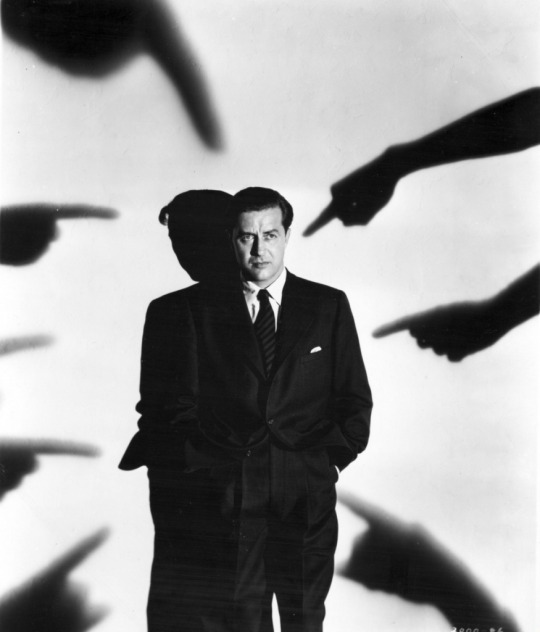
What really puts the film over the top for me is Ray Milland. While Milland never considered himself a very good actor, thankfully many great directors disagreed with him. Milland has the unique talent of injecting a touch of levity through his reactions, movements, and expressions at just the right moments. He can make characters that, on paper, might be unlikeable, unsympathetic, or just plain bland into very real people. In Alias Nick Beale (1949), Nick Beale is a seedy underworld operator. Not too much is explained about him but you feel so much about his past and his character through the small (or large) falters in the Beale facade that Milland portrays. In The Lost Weekend (1945), Milland finds a balance with Don Birnam by evoking in the viewer similar feelings to what you may feel when someone you love is suffering from mental illness. You continue to feel deeply for him despite his stream of self-destructive actions. You understand exactly why his loved ones would stay or go. In Ministry of Fear, Milland channels the feelings of being in the midst of a nightmare while also having pitch-perfect reactions to the film’s absurdities that border on the surreal. I should stop now before I go into my spiel on how he “plays English” versus how he “plays American.”
Where can I find it?
At Movie Madness under Classic Directors - Fritz Lang
The Lady from Shanghai (1947)
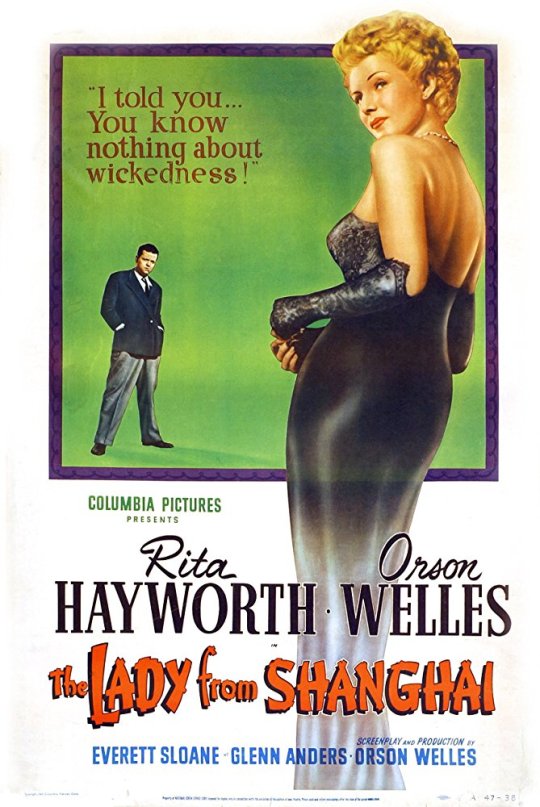
87 min. | Director: Orson Welles
Screenwriter: Orson Welles
Stars: Rita Hayworth, Orson Welles
What’s the story?
Sailor Michael O’Hara (Orson Welles) saves the beautiful and married Elsa Bannister (Rita Hayworth) from some robbers in Central Park. Elsa and her lawyer husband, Arthur (Everett Sloane) are on their way via the Panama Canal to San Francisco and Michael is hired to work on their yacht. Michael starts to fall for Elsa. Arthur’s business partner, Grigsby, sees his opening and convinces Michael to collaborate on a plan to fake his own death. As it turns out, there are scams on top of scams, and Michael ends up framed for murder and he must now rely on Arthur and Else to defend him.
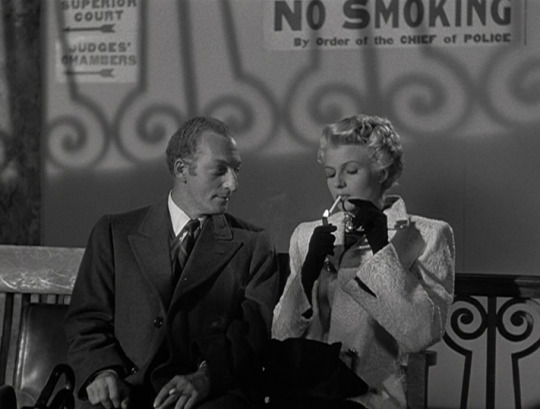
Why should I watch it?
The Lady from Shanghai is a very unique film for the time, in ways that made it unpopular with many contemporary American viewers, but also in ways that make it well suited for modern viewers. Distaste for Rita Hayworth playing against type is not much of an issue for a viewer in 2017. The on-location shooting adds naturalism despite the film’s stylized lighting and cinematography. To a 1948 viewer, this could be too much of a departure from form, but it’s fully normal to a 2017 viewer. One of the most spectacular elements of the film is a shootout climax in a hall of mirrors, which a 2017 viewer has seen replicated a few times since (most recently in John Wick 2). While Lady from Shanghai should hold a lot of familiarity to an audience in 2017, it still feels novel and imaginative. It’s also a film that doesn’t narratively hold your hand. You’re along for the ride and you best keep up.

Where can I find it?
At Movie Madness under Classic Directors - Orson Welles
Leave Her to Heaven (1945)
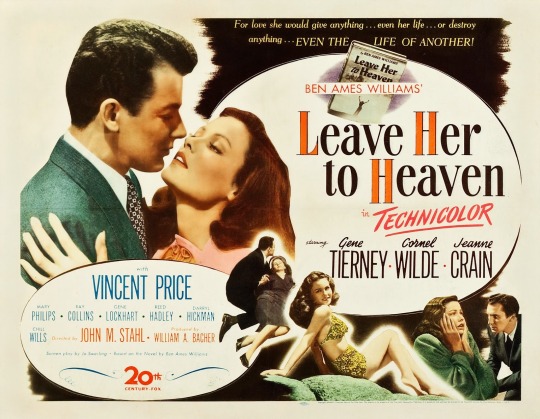
110 min. | Director: John M. Stahl
Screenwriter: Jo Swerling (Novel by Ben Ames Williams)
Stars: Gene Tierney, Cornel Wilde, Jeanne Crain, Vincent Price
What’s the story?
After a chance encounter on a train, the well-to-do Ellen Berent (Gene Tierney) and novelist Richard Harland (Cornel Wilde) fall in love a little too quickly. Ellen falls because of Richard’s notable resemblance to her late father. Richard falls because of Ellen’s mysterious nature and brooding beauty. Ellen jilts her more socially-acceptable fiance Russell Quinton (Vincent Price) for Richard and they move to his remote home in Maine. Ellen’s obsessive and possessive tendencies get deeper and more dangerous after Richard’s disabled baby brother comes to live with them and it all goes to hell from there.
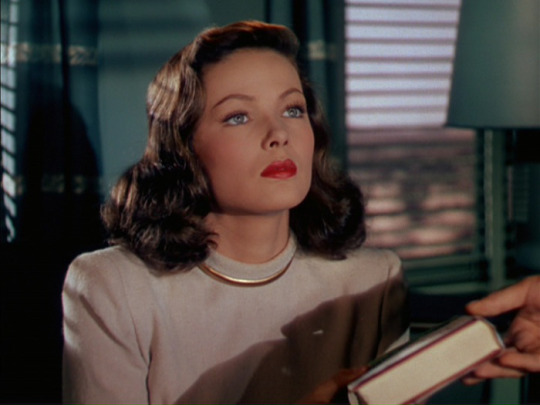
Why should I watch it?
Leave Her to Heaven has no shortage of selling points. Gene Tierney gives one of her best performances in this film. She has such subtlety early on, hinting at the storms to come, and Ellen’s neuroses-driven cruelty is rendered so effectively. Tierney was absolutely ahead of her time.

Leave Her to Heaven is strikingly beautiful. The locations in Maine and New Mexico are exquisite and made more interesting by the contrast to the twisted psychology and cruelty of the characters. This one might need content warnings though. I don’t want to give away too much to a general readership, so if you have any concerns, let me know!

Where can I find it?
At Movie Madness under General Classics A to Z
The Strange Love of Martha Ivers (1946)

116 min. | Directors: Lewis Milestone and Byron Haskin
Screenwriter: Robert Rossen (Novel by John Patrick)
Stars: Barbara Stanwyck, Van Heflin, Lizabeth Scott, Kirk Douglas
What’s the story?
Young Martha Ivers tries to run away from her strict and antagonistic aunt with the help of a poor boy called Sam Masterson. The attempt fails and when returned home, Martha and her very wealthy aunt have a blowout and Martha knocks her aunt down the stairs, killing her. The scene is witnessed by another boy, Walter O’Neil. With the help of Walter’s father, they manage to cover up the crime, blaming the murder on an intruder. Years later, Martha (Barbara Stanwyck) has built up a very successful business with her inheritance and is a staple of the Iverstown community. She is also in a strained marriage with Walter (Kirk Douglas), now the District Attorney. When Sam (Van Helfin), now a detective, chances his way back to town, Walter and Martha’s paranoia over the cover up reaches a boiling point.

Why should I watch it?
As someone who has spent a lot of time in Pennsylvania, I must say that Iverstown is a perfectly captured factory town. That might be a too specific draw for a movie, but that’s okay, there’s lots more to love about this film. The structure of the plot is almost flawless. The Strange Love of Martha Ivers is a master class in how to build conflict and tension around dramatic irony in a modern setting. That’s all I’ll say on that to avoid giving too much away. Barbara Stanwyck puts in one of her best performances in this film and Kirk Douglas holds his own in Stany’s wake despite it being his first film. It’s no wonder he became one of the biggest movie stars of the last century.

Where can I find it?
At Movie Madness under Classics - Film Noir
Diabolique / Les Diaboliques (1955)
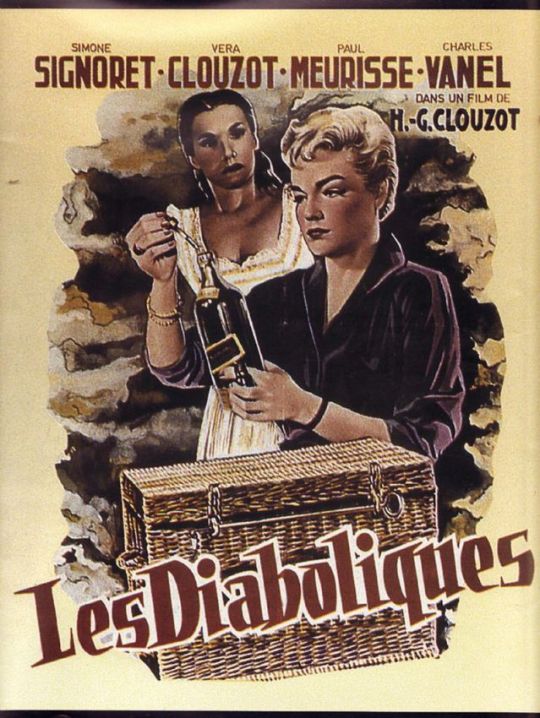
107 / 114 min. | Director: Henri-Georges Clouzot
Screenwriters: Henri-Georges Clouzot, Jérôme Géronimi (Novel By by Pierre Boileau and Thomas Narcejac)
Stars: Simone Signoret, Véra Clouzot, Paul Meurisse
What’s the story?
There’s an awful lot going on at a rundown boarding school just outside Paris. The headmaster, Michel (Paul Meurisse), lives there with his ailing wife Christina (Véra Clouzot) but is carrying on a relationship with English-teacher Nicole (Simone Signoret), who also lives at the school. Michel is abusive to both of them, but the women seem to have a cooperative and caring relationship with one another. Eventually, Nicole can no longer abide the abuse and cooks up a plan with Christina to murder Michel. After they put their plan in action, the aftermath isn’t quite what they anticipated.
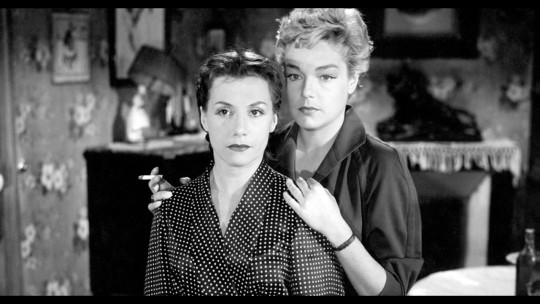
Why should I watch it?
Diabolique is one of the greatest suspense films ever made. If you’re a Hitchcock fan, this is a must-see movie. Hitchcock praised the film often and its influence can be seen strongly in his work in the late-1950s into the 1960s. (The novel Diabolique is based on was written By Boileau and Narcejac who wrote the source novel for Vertigo (1958).) In my estimation, it creatively revived Hitchcock as a director.
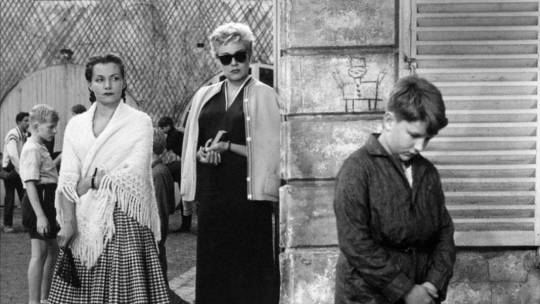
The locations are hauntingly shabby and mirror Christina’s internal strife, both her physical ailment and psychological stress. In all honesty, I’m struggling a little bit to discuss the high points of the film without giving too much away. That shouldn’t be too surprising though, given that this is one of the first films to carry a spoiler warning.
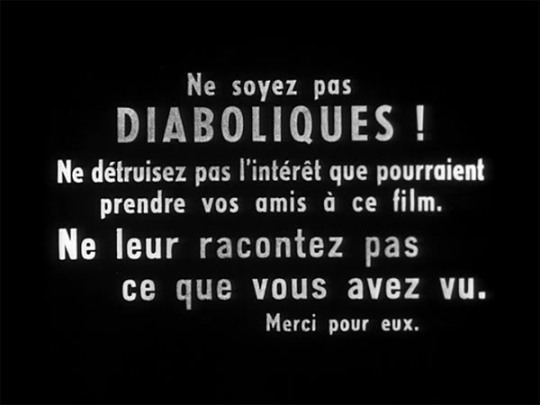
“Do not be evil! Do not destroy the interest your friends might have in this movie. Do not tell them what you saw. Thanks for them.”
Where can I find it?
At Movie Madness under French Film - French Directors - Henri-Georges Clouzot
Mildred Pierce (1945)
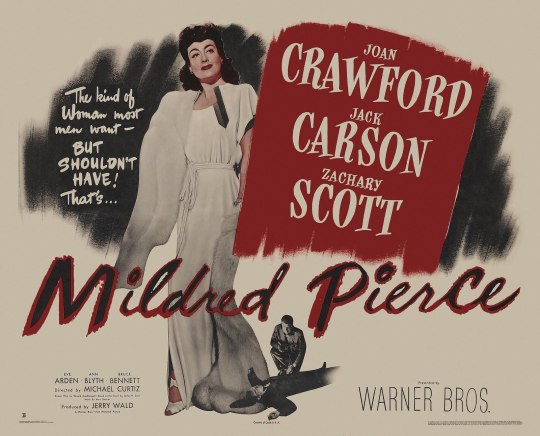
111 min. | Director: Michael Curtiz
Screenwriters: Ranald MacDougall, Catherine Turney (Novel by James M. Cain)
Stars: Joan Crawford, Jack Carson, Zachary Scott, Ann Blyth, Eve Arden
What’s the story?
Monte Beragon (Zachary Scott) is murdered, shot dead in his beach house. His wife, Mildred Pierce Beragon (Joan Crawford) flees the house. When Mildred is brought in by the police, she finds out that her first husband, Bert, is going down for the murder. In an effort to protect him, for she knows him to be innocent, Mildred begins telling the detective the story of the past few years of her life that led her to that beach house with her ex-husband’s gun. However, the story may be a little more complicated than she lets on.
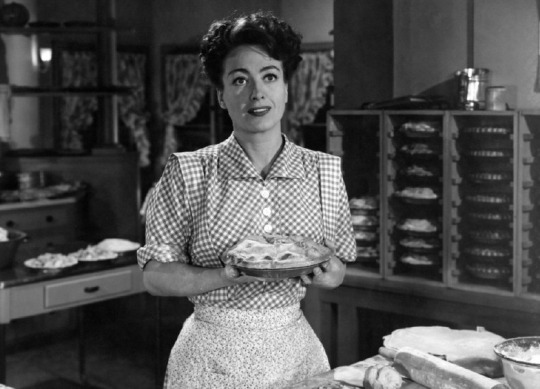
Why should I watch it?
Mildred Pierce was adapted from a novel of the same name by James M. Cain, whose work was also adapted for Double Indemnity (1944) (which I mentioned in my last Noirvember post) and The Postman Always Rings Twice (1946). If you like those films, there is a very good chance you’ll also like Mildred Pierce, but this film is a little less hard-boiled than the others. Mildred Pierce is a skillful intertwining of noir with “weepies,” the melodrama sub-genre. How far the love of a wife and mother can reach is not a common Noir story, but how twisted that love can be is actually perfect Noir fodder.
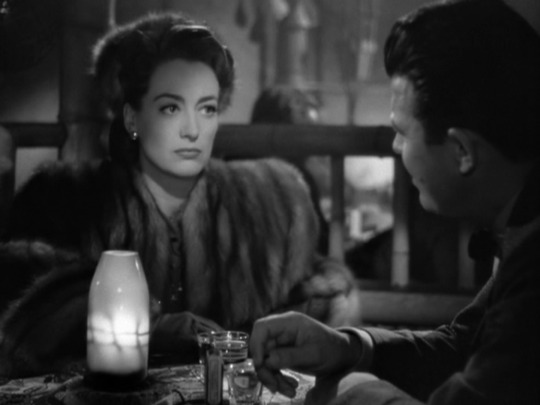
Joan Crawford rightfully won an Academy Award for her portrayal of the title character, but she’s girded by rich performances from the supporting cast. Eve Arden and Butterfly McQueen always stand out to me in this film, both infusing a whole lot of character into their rather small roles.
Mildred Pierce is also shot beautifully. It’s a perfect Noir image of rainy mid-century Los Angeles.
Where can I find it?
At Movie Madness under Classics - Classic Actors - Joan Crawford
#noir#Film Review#film#film noir#movies#movie review#noirvember#movie madness#portland#portland oregon#hollywood theatre#French film#diabolique#les diaboliques#simone signoret#ministry of fear#ray milland#fritz lang#henri-georges clouzot#vera clouzot#the strange love of martha ivers#barbara stanwyck#kirk douglas#mildred pierce#joan crawford#Michael Curtiz#leave her to heaven#gene tierney#lady from shanghai#rita hayworth
121 notes
·
View notes
Text
I have 3 rules for my personal happiness:
1) Don’t want anything.
2) Don’t make plans.
3) Don’t have ambitions.
Actually, 2 and 3 are part of Rule Number 1. Now...sometimes, despite my better judgement, I end up breaking rule number one. And invariably I get pissed off. Because wanting things, making plans, and being ambitious, all lead into personal disappointment and failure for me, and I’m not very good at dealing with that in a constructive manner. It’s far easier to not be disappointed in yourself by never having a need to FEEL that way in the first place. Right this very moment I have broken all three rules and feel incredibly pissed because the disappointment has already set in.
I wanted to undertake some artistic endeavor next month specifically so I could use the hashtag “Noirvember” and I thought that would take the form of a brief photo comic akin to the cut-scenes in the first Max Payne game. Except I CAN’T DO IT. I don’t have the TIME, CREATIVITY, or IDEAS. And it’s eating me up, because I already allowed myself the wanting, planning, and let my ambition have a little bit of free rein. Now I have to backtrack and scrub it from my mind, because it’s going to be a whole lot easier to do THAT, than to struggle with my inability to schedule my “free time” into something coherent and usable.
*sigh* So I’m ranting about it to help get back to My Zen-Zone.
I COULD try to turn “Noirvember” into something achievable, but I’m already down on the work and effort I’d have to put into it. I’m already pissed off at the WANTING in the first place. (I hate breaking Rule Number 1.)
Eh, well, I feel better for having ranted. I shall now go and regain my equilibrium and reset my mind into Zen-Mode.
#ranty rant#I'm in a ranty mood#rant#personal rant#Moody#I'm in a mood#I'll get over it#But right now I'm kinda pissed
0 notes
Text
Backfire (1950)
Today on the blog, #Noirvember wraps up with a review of BACKFIRE (1950):
Happy #Noirvember! TMP has celebrated film noir with a review from the genre every Sunday this month. To bring the celebration to a close, today’s film is 1950’s Backfire. Previously in this series: When Strangers Marry (1944), Decoy (1946), No Man of Her Own (1950) (Image via Movie Poster Shop) Bob Corey (Gordon MacRae) was wounded near the end of the second World War and is now attempting to…
View On WordPress
#1950s#backfire#classic film#crime drama#dane clark#film#film noir#noir#noirvember#vincent sherman#virginia mayo
0 notes
Text
Out Of The Past (1947)
“Nothing in the world is any good unless you can share it.”

French director, Jacques Tourneur's ‘Out Of The Past’ has over the years become what’s considered the best Film Noir ever made, though it somewhat disputes over that title with ‘Double Indemnity’, a lot of people find one of the two the best.
I have however during the time that I’ve been participating in Noirvember (there’s more to cover), obviously quite a few films in the genre, and I can instantly say without hesitation that ‘Out Of The Past’ has been my favorite one that I’ve watched so far.
It’s also save to say that outside the context of Noir and Noirvember, it’s simply one of the best films I’ve had the pleasure of watching, just one of those films that quite simply put leaves you feeling like you’ve just watched something spectacular and well crafted.
it makes me regret that I didn’t take the decision to participate in Noirvember earlier, anyhow it’s wonderful to immerse yourself fully in a genre, discover and learn about it and obviously watch a few films of it.
And Out Of The Past was along with Double Indemnity one of the films that my Cinema History book kept mentioning (probably one of the first books I’d try to save in a fire) and various corners of the internet kept recommending to me. By now I was immensely curious about the film, even so much as its film poster somehow exuded a certain cool.
So later I sat down to watch it. And I think it speaks very positively of the film, that I watched it with someone who’s absolutely not a fan of anything that’s not in color and so-called Classics, but she claims to have had as much fun with this one as I did.
When we were about ten minutes into the film, and the picture starts to craft an air of mystery and intrigue and you already know something’s wrong, she said “I love this”, “It’s already so suspenseful, it’s like one of those cheap detective books”.
And with that, she pretty much hit the nail on the head. I found out that Noir works closely with pulp fiction, which is actually nowadays usually considered quite cheap entertainment, the thing that’s considered a guilty pleasure to read; but they did sometimes have interesting themes in them, and filmmakers saw that and could work with it.
Noir’s a dark and pessimistic genre, it literally means black in French, that its name is European also has its reason, it’s what French critics started to call the genre, but it fits perfectly.
It originated in a pessimistic period, before and until after World war two, many of its directors and stars, we’re Europeans that fled Europe, so while it’s an American genre, it’s safe to say that it’s a genre in which both continents held each other’s hands.
War doesn’t bring out good qualities in humans generally, but even during wartime, people have been known to undertake courageous and goodhearted actions. And the genre, some films more than others reflect that.
Most of them very clearly seem to say the world is rotten and the people, even the ones that don’t know it are bad, sometimes they become forcedly so; but it very has the idea that everyone has the potential to become a bad person, a person capable of double-crossing and murder, murder seems to be written in capital letter M all over the genre.
Yet under all that seeming bleakness, pessimism, hopelessness and darkness, there are glints of hope and hints at the possibility of a happy ending, the tragic thing about the genre is that it’s acknowledged but it doesn’t go there, sometimes because it’s characters just can’t take that route, they just aren’t able to connect, and chose to either save their own skin or will take a route that’s going to going to endanger them.
And what I loved so much about ‘Out Of The Past’ is that it very much has those elements, and becomes in a way almost a retelling of a tragic, doomed to fail love story, only it shouldn’t have been doomed, the characters made it so themselves.
It very much plays with what other films in the genre also play with, ambiguity between good and bad, and it has as I’ve mentioned all the elements of the genre, a troubled protagonist whose past comes back to haunt him, character’s smoking like chimneys, a femme fatale, pretty night scenes, and a large part of the story taking place in an urban environment.
But still something about this one is unique; as many people have recognized, out of all the Noir I’ve seen in November this is the one that’s really engraved in my memory. Some people say it doesn’t even seemingly look like Noir, at first sight.
It’s too bright and too sunlit, too much of it takes place in sunlight and in pretty surroundings, that have nothing to do with seedy, crime-filled streets of some films in the genre.
Still agreed it’s agreed that it is Noir, as it has in its storyline and in its cinematography typical elements.
But when I myself thought about it more deeply (and I’m not the only one) you can almost say that the film has two parts, one that looks less typically Noir and one that’s more typically so, night scenes, fights, double-crossing, playing with shadows. But amazingly it watches like one cohesive whole.
It might be somewhat of a lighter one in its genre, literally in its lightning, but also as in that it really builds your hope up and for a moment when you’re watching for the first.
You think everything even after the characters has been double-crossing each other like crazy, you still think it’s two lovers have a chance of being together, but then the film makes sure to remind you what kind of film you’re watching.
And that’s what I found so great about it, that it’s two lovers have moments of happiness and you see what could be there, and because of their own doing, it doesn’t happen, and it’s tragically and sublimely sad.
What I truly loved about this one is watching the relationships between characters, and watching Robert Mitchum and Jane Greer act opposite each other, there’s a ton of other actors in there (amongst them Kirk Douglas) but Mitchum and Greer compliment each other perfectly and it’s a joy to watch. Its storyline doesn’t even really matter too much, and it’s a challenge, to sum up...
Mitchum Bailey is a private detective who tries to say goodbye to his job after a few nasty experiences. As a garage owner, he tries to start a new life with his girlfriend Ann (Virginia Huston). His anonymity, however, is short-lived when thug looking Joe Stephanos (Paul Valentine) manages to trace him on behalf of professional gambler Whit Sterling (Kirk Douglas).
Whit was shot some time ago by his beloved Kathie (Jane Greer). Since then, she has disappeared from his life, as well as $ 40,000. Whit wants her and his money back and asks Jeff to go and investigate. Somewhat cautiously, Jeff takes the job, old habits die hard I guess.
He meets Kathie in Mexico. She tells him exactly what’s going on but nothing about the disappeared money. Jeff believes her, falls for the charms of this femme fatale and tells Whit that he was unable to find her. Soon, however, Kathie doesn’t seem as sweet as she looks anymore...
Does Kathie really care about Jeff? Does she love him despite her inability to endure difficult situations for him and despite her fatalistic attitude towards love?
And how sincere is Jeff towards her? Has he succumbed to her again? These questions haunt your mind while seeing 'Out of the Past'.
As traditionally in this genre, the riddles around a fateful love remain unclear. Who is lying, who is honest? Nobody can be trusted and that makes watching a film noir of this level is so irresistible.
And as it should be; you don’t get clear answers to all of these questions, and thus as I’ve seen in a lot of reviews, people speculate and come to their own conclusions when watching the film.
You see two interesting directions: In some Jeff is the victim. An innocent man, forced to make bad choices but who didn’t enjoy them, but who fell victim to the whims and seduction of a femme fatale, to them Kathie’s a monster, that tormented an innocent man, and there’s no real effort to look any further.
No one in the genre is entirely innocent, Jeff’s aware he’s being played but still consciously chooses for the woman he knows is no good, he still acted out of free will, no one really forced him into anything.
And then the femme fatale herself, a monster? Or just a flawed human being that made mistakes? As I mentioned when it comes to that, you see people mostly veering in one of these two directions.
Personally I think she’s one of the most brilliant characters in the film; Greer portrays her in a subtle yet confident way, that’s almost dizzyingly exciting to watch, she infuses her role with confidence (the kind of confidence of a woman who knows how beautiful she is) but at other times also a deep vulnerability and even fear.
Throughout the film she’s in a world that surrounds her with violent men she’s afraid of the man that she stole the money from, she believes he’d never leave her alone and would almost certainly come after her, and she turns out to be right.
You can understand why she stole the money even, she hated the guy's guts and wanted to get away from him, and if you’re running away from a dude with anger issues, why not do it in a place with an agreeable climate? I certainly wouldn’t like hearing this:
“You're gonna take the rap and play along. You're gonna make every exact move I tell you. If you don't, I'll kill you. And I'll promise you one thing: it won't be quick. I'll break you first. You won't be able to answer a telephone or open a door without thinking, 'This is it.' And it when it comes, it still won't be quick. And it won't be pretty. You can take your choice.”
The exciting element in Greer’s performance comes from, how composed seemingly even cold she seems throughout much of the film, but when you look closer there’s intense emotion, and she remains a riddle, a mystery.
I spent much of the film trying to read her, and she very much has both bad and good at her, she doesn’t regret shooting a man, and when Jeff fights another man, after she speaks the words “why don’t you break his head, Jeff?” she seems almost aroused watching the two men fight, which certainly indicates some twisted personality trait.
But then she also ultimately seems to really love him, as she later in the film goes back to Jeff and gives herself fully over to him, as she chooses to trust him fully, but he is at this point deceiving, maybe still in love with her, but certainly not willing to die for her, and he’s posing himself as more in love than he really is.
But at this time; Jeff has already decided she can’t be trusted, as he told her: “You can never help anything, can you? You're like a leaf that the wind blows from one gutter to another.” and he’s unwilling to give her a second chance or to forgive, and on that tragic note, both their loveless fates are sealed. So it can also be regarded in my eyes as a tragic love story, maybe Jeff could even be seen as a coward in his inability to forgive in love.
The big joy in the film, however, is how good Mitchum and Greer are (that and how beautifully filmed it is), while Greer seems to do not much else than bat her big doe eyes with their luscious lashes at Mitchum and make him fall head over heels with her, she has as I said a subtle emotionality, there’s depth to this femme fatale if it isn’t clear, I loved her performance.
And Mitchum’s Jeff has an air of indifferent, unforced cool, and seems to come across almost as if he doesn’t give a damn about anything or anyone that surrounds him, as if he’s somehow outside of present events, he only seems to care about either Kathie or ultimately himself.
Mitchum portrays this figure almost perfectly. Like Humphrey Bogart (who was considered for the role, but not even Bogie could be at two places at once ...), he has a certain inner peace about him, which gives him independence and self-confidence.
The man behind this film is French director Jacques Tourneur, who made his name in the United States in 1942 with both the artistically and commercially successful 'Cat People' (which is noted on my list of stuff I want to see). Tourneur was a master in creating the right mood and atmosphere and that skill came in handy when he made 'Out of the Past'.
The typical film noir look - with striking use of shadows and contrast - is certainly present here (the fight scene is a beautiful playing around with shadows as well as the scenes on the beach) but less dominant than in, for example, 'Double Indemnity' (1944). It makes 'Out of the Past' a film that looks pleasant and easy and literally and figuratively is somewhat lighter than its genre and contemporaries.
Out of the past is a dark, cynical treat with an intelligent script, razor-sharp dialogues and a finale that stays with you. Highly recommended!


“If you're thinking of anyone else, don't. It wouldn't work. You're no good for anyone but me. You're no good and neither am I. That's why we deserve each other.”
#out of the past#out of the past 1947#out of the past movie#out of the past film#noir#film noir#cinema noir#noirvember#noirvember 2017#jacques tourneur#jane greer#robert mitchum#kirk douglas#daniel mainwaring#nicholas musuraca#movies#films#movie review#film review#cinema#filmista
11 notes
·
View notes